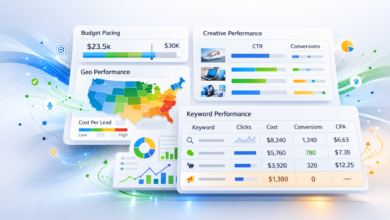Data-Driven Marketing: A New Relationship

▼ Summary
– Marketing has become overly reliant on data that often proves meaningless, disconnected from real outcomes like revenue or human connection.
– The industry shifted from understanding consumer behavior to manipulating emotions at scale, prioritizing engagement metrics over genuine service.
– Apps and tech platforms extract vast amounts of personal data through opaque terms, sharing it with unnamed partners without meaningful user consent.
– Industry associations often protect the status quo by opposing stronger privacy regulations and preserving extractive data practices.
– The Clean Data Alliance advocates for a new digital economy built on transparency, verified data, and user control to rebuild trust and fairness.
Data-driven marketing promised a smarter approach to connecting with consumers, yet somewhere along the line it lost sight of genuine human relationships. The original vision of bridging creativity and commerce has been overshadowed by a system that prioritizes metrics over meaning, leaving both brands and customers disillusioned.
Throughout my career in senior digital marketing roles, I viewed marketing as the vital link between what companies create and what people genuinely desire. Armed with sophisticated dashboards, key performance indicators, and analytics engines, I believed rigorous measurement and personalization could transform marketing into a precise science. However, beneath the impressive graphs and celebrated minor lifts, a troubling reality emerged. The data we relied on often failed to connect to tangible outcomes like revenue growth or customer loyalty. Multimillion-dollar operations frequently depended on unverified or even fabricated information, while campaigns on major platforms used metrics that barely reflected real-world results. We were essentially guessing rather than truly understanding consumer behavior.
Marketing gradually shifted from exploring why people feel certain emotions to systematically provoking reactions, typically urgency, envy, or inadequacy. What we labeled engagement was often manipulation executed on a massive scale. Inside organizations, teams competed for credit rather than collaborating toward shared goals, and agencies pursued awards instead of authentic impact. Campaigns were designed to impress industry peers, not to meaningfully serve the audiences we claimed to understand.
After leaving the corporate world to start my own consultancy, I recognized the systemic issues my career had obscured: misaligned business models, cultures in denial, unnecessary products, and unbelievable brand stories. At the core was the pervasive issue of dirty data, which created an illusion of precision while masking a lack of genuine insight. The deeper problem, however, was a corruption of incentives, nowhere more evident than in the dirty data economy that sells the fantasy of control while systematically extracting value from users.
Consider the experience of downloading a survey app promising easy earnings. One such app, Surveys On The Go, presents a cheerful facade, but its terms and conditions reveal a different story. Analyzing its policies with a specialized tool uncovered over 25 clauses favoring the company, including continuous background data collection through geolocation and sharing information for behavioral analysis. Users trade their opinions, habits, and movements for small payments, while the company builds valuable long-term behavioral profiles.
Key findings from the fine print include documents longer than most novels, a single “I agree” tap that surrenders extensive personal data, a global and perpetual license for the company to use and sell your information, undisclosed partners you cannot opt out of, terms that can change without explicit consent, and no true opt-out even after deleting the app.
This model extends to Big Tech firms and data brokers like Meta, Google, Amazon, Experian, Oracle, and Acxiom. Their strategy remains consistent: overwhelm users with lengthy agreements, collect every possible data point, and retain it indefinitely. Retargeted ads and personalized recommendations represent a form of industrialized intimacy, where user interactions are monetized without meaningful consent.
Meta’s terms, for example, allow it to use your content and interactions to train algorithms and infer emotions, even after you delete posts. Google combines search history, location data, and email content to construct detailed behavioral dossiers for advertisers. Amazon tracks not only purchases but also browsing behavior, such as cursor hover times, to predict and influence decisions. Data brokers compile and sell thousands of attributes about individuals, from income and political views to health conditions, often without awareness or compensation.
Apps frame data extraction as user rewards, but their design encourages compliance over informed consent. Features like fear of missing out, scarcity timers, and gamification hooks are engineered to secure user submission, not to provide genuine value. Personalization has become a euphemism for profiling, leaving people feeling monitored rather than understood. This erodes trust, fosters anxiety, and creates a pervasive sense that users are the product, not the beneficiaries.
Addressing this requires prioritizing transparency and fairness over extraction. The current system is designed to collect, conceal, and profit, and reversing it demands more than superficial privacy updates. It necessitates rethinking data ownership, control, and benefits.
This realization spurred the creation of the Marketing Accountability Council (MAC), aimed at confronting an industry that had lost its ethical compass. MAC sought to expose the illusions of data-driven integrity, corrupted consent, and performative ethics. Through a series of meetings, it became clear that marketing strategies relied on compromised inputs: dirty data, fraudulent metrics, and opaque attribution models. The industry had traded truth for performance theater, where adtech feigned prediction and brands pretended to care, selling surveillance as personalization and dashboards as truth.
This reckoning shifted the focus from incremental improvement to foundational change. Accountability alone was insufficient; rebuilding trust required new infrastructure. This led to the Clean Data Alliance (CDA), an initiative to reconstruct the digital economy on principles of transparency, truth, and human agency. Together with MAC, CDA is developing a framework where verified, permissioned data, referred to as data agency, can outperform deception. The goal is to empower individuals with real control over their information, making truth more profitable than deceit.
Why can’t this change originate from within existing industry structures? Most marketing trade associations defend the status quo. Groups like the Association of National Advertisers (ANA), the Interactive Advertising Bureau (IAB), and segments of the American Association of Advertising Agencies (4As) often frame responsible data use as reform while lobbying to preserve extractive practices that undermine trust.
In 2024, the ANA joined the Privacy for America coalition, which is funded by adtech intermediaries and data brokers. While its mission advocates for balanced privacy legislation, the details reveal opposition to stronger data broker regulations and support for continued data collection without direct consumer consent. The ANA’s own 2023 study found that approximately 23% of digital ad spending, around $22 billion annually, is lost to opaque fees, fraud, and unverifiable transactions. Instead of demanding accountability, the association called for greater collaboration within the existing ecosystem, avoiding substantive reform.
The IAB similarly opposed Apple’s App Tracking Transparency framework, arguing it would harm small businesses, despite the change merely requiring user permission for tracking. Its leadership has labeled privacy advocates as extremists, illustrating the industry’s resistance to genuine consent.
This is how the system perpetuates itself. Incumbent players act as gatekeepers of a trillion-dollar surveillance economy, relying on collective ignorance to maintain operations. Their privacy frameworks are self-regulated, audits are selective, and alliances are structured to appear ethical while preserving data and revenue flows through hidden channels.
Consequently, the CDA was established outside traditional systems. Its purpose is not to refine a broken model or add another checklist, but to replace extraction with empowerment. It aims to demonstrate that clean data, verified, permissioned, and anonymous, can consistently outperform deceit.
Every marketer now faces a critical choice: continue chasing dirty data, hollow KPIs, and transient clicks, or contribute to building a better alternative, markets founded on transparency, consent, and truth. For those who recognize that trust is the only growth metric that truly matters, the path forward is clear. It involves abandoning the pursuit of empty numbers and committing to an economy rooted in clean data, fairness, and human dignity.
(Source: MarTech)





